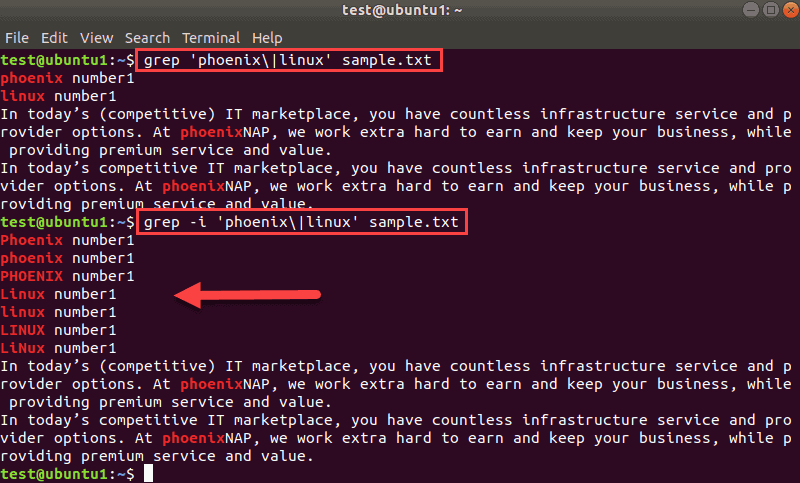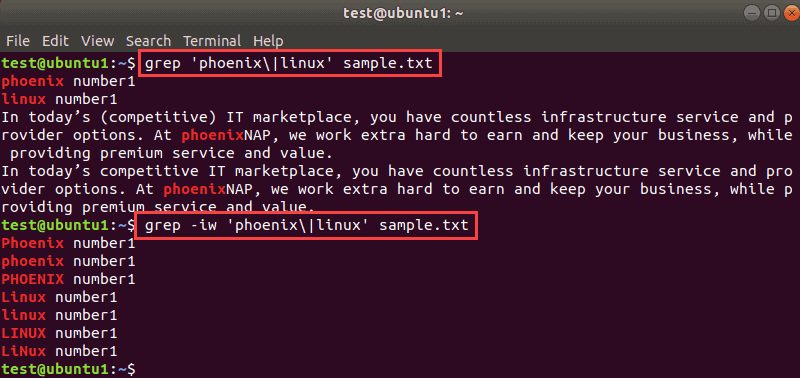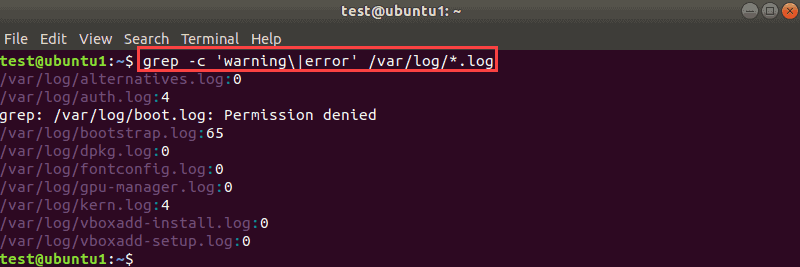Read in Multiple Text Files One at a Time C++ Pipes
Introduction
Grep is a powerful utility available by default on UNIX-based systems. The proper name stands for Global Regular Expression Print.
Past using the grep control, you lot can customize how the tool searches for a blueprint or multiple patterns in this instance. You lot can grep multiple strings in unlike files and directories. The tool prints all lines that contain the words you specify as a search pattern.
In this guide, we volition show y'all how to apply grep to search multiple words or string patterns. Follow the examples in this tutorial to larn how to utilize grep most effectively.

Prerequisites
- Linux or UNIX-similar system
- Admission to a terminal or command line
- A user with permissions to access the necessary files and directories
How to Grep Multiple Patterns – Syntax
The basic grep syntax when searching multiple patterns in a file includes using the grep command followed by strings and the proper noun of the file or its path.
The patterns need to be enclosed using single quotes and separated past the pipage symbol. Use the backslash before pipe | for regular expressions.
grep 'pattern1\|pattern2' fileName_or_filePath The latest way to use grep is with the -Eastward pick. This option treats the pattern you used as an extended regular expression.
grep -E 'pattern1|pattern2' fileName_or_filePath The deprecated version of extended grep is egrep.
egrep 'pattern1|pattern2' fileName_or_filePath Some other choice is to add multiple separate patterns to the grep command.
To do so, apply the -e flag and continue adding the desired number of search patterns:
grep -e pattern1 -due east pattern2 fileName_or_filePath What is the Difference Between grep, grep -Eastward, and egrep?
The egrep control is an outdated version of extended grep. It does the same function as grep -East .
The divergence between grep and extended grep is that extended grep includes meta characters that were added subsequently.
These characters are the parenthesis (), curly brackets {}, and question mark. The pipe character | is as well treated as a meta character in extended grep.
Examples of Using Grep for Multiple Strings, Patterns and Words
To make certain you empathize how to use grep to search multiple strings, we propose creating a file with some text on which we are going to try out a couple of different use cases.
In our example, we named the file sample.txt and added a few paragraphs of text. We stored the file in the directory of the test user, that is, in /dwelling/test/sample.txt
How to Grep Multiple Patterns in a File
In the examples below, nosotros will use grep instead of extended grep. Do not forget to apply the backslash before the pipage character.
Since grep does not support the pipage symbol equally the alternation operator, yous need to employ the escape character (backslash \) to tell the grep command to care for the pipe differently.
For instance, to search for the words actress and value in the sample.txt file apply this command:
grep 'extra\|value' sample.txt The output highlights the string yous wanted to grep.

If the aforementioned file is in some other directory, you need to navigate to that directory or utilise the full path of the file:
grep 'extra\|value' /dwelling house/exam/Desktop/sample.txt To search for more than ii words, go along adding them in the same manner.
For example, to search for three words, add together the desired string of characters followed by a backslash and pipe:
grep 'extra\|value\|service' sample.txt 
Permit's see how the in a higher place grep command looks when using grep -E , egrep , and grep -east :
grep -Due east 'extra|value|service' sample.txt egrep 'extra|value|service' sample.txt grep -e extra -eastward value -e service sample.txt We will use grep in further examples, but you can use whichever syntax you lot prefer.
Search for Multiple Verbal Matches in a File
If y'all desire to detect verbal matches for multiple patterns, pass the -w flag to the grep command.
grep -w 'provide\|count' sample.txt For example, the output below shows the difference betwixt searching without -west and with it:

Equally you tin encounter, the results are unlike. The showtime command shows all lines with the strings yous used.
The second command shows how to grep exact matches for multiple strings. The output prints just the lines that contain the exact words.
Note: Grep offers many functionalities. Acquire how to use grep for additional use cases.
Ignore Instance when Using Grep for Multiple Strings
To avert missing something when y'all search for multiple patterns, use the -i flag to ignore letter case.
For example, we will ignore case with this command:
grep -i 'phoenix\|linux' sample.txt 
The output shows how the two commands differ. If y'all include the -i flag and ignore letter case, the effect for multiple matches includes all matches.
This mode, you lot go additional results. If you lot as well add the -w flag to this command, y'all can narrow downwardly the results even further:

Show the Count of Multiple Matches in a File
Allow'due south say you are monitoring a log file, and you want to run across if the number of warnings or messages increases. You don't desire to see detailed results when a large number of matches return.
For example, to show the count of multiple matches in the bootstrap.log file, enter:
grep -c 'alert\|error' /var/log/bootstrap.log 
The output prints the number of matches. This way, y'all can apace determine if the number of warnings and errors increased.
Grep for Multiple Patterns in a Specific File Type
You can utilise grep to search multiple strings in a certain type of file only. If y'all want to monitor log files in one directory or if you desire to search through all text files, use an asterisk and the file extension instead of a file proper noun.
For example, to search for warnings and errors through all .log files in the /var/log/ directory, enter:
grep 'warning\|fault' /var/log/*.log To meliorate demonstrate how this pick works, we will merely show the count of matches.

The output shows all the files that grep searched through for the strings you used.
Note: If you get a "Permission denied" message, as we did in the case above, yous need sudo privileges. To include all files, use sudo with the grep control. Enter the sudo password, and grep will search through all files.
Search Recursively for Multiple Patterns in a File
The grep command searches only in the current directory when you lot use the asterisk wildcard.
To include all subdirectories when searching for multiple patterns, add the -R operator to grep:
grep -R 'warning\|error' /var/log/*.log The output will return results from all files the grep command establish in the /var/log/ directory and its subdirectories.
Conclusion
In this tutorial, you lot learned how to use grep to search multiple words or cord patterns in a file. The guide also showed you how to use extended grep.
The examples in this article help you practice how to refine your grep search.
Was this commodity helpful?
Yes No
Source: https://phoenixnap.com/kb/grep-multiple-strings
0 Response to "Read in Multiple Text Files One at a Time C++ Pipes"
Post a Comment